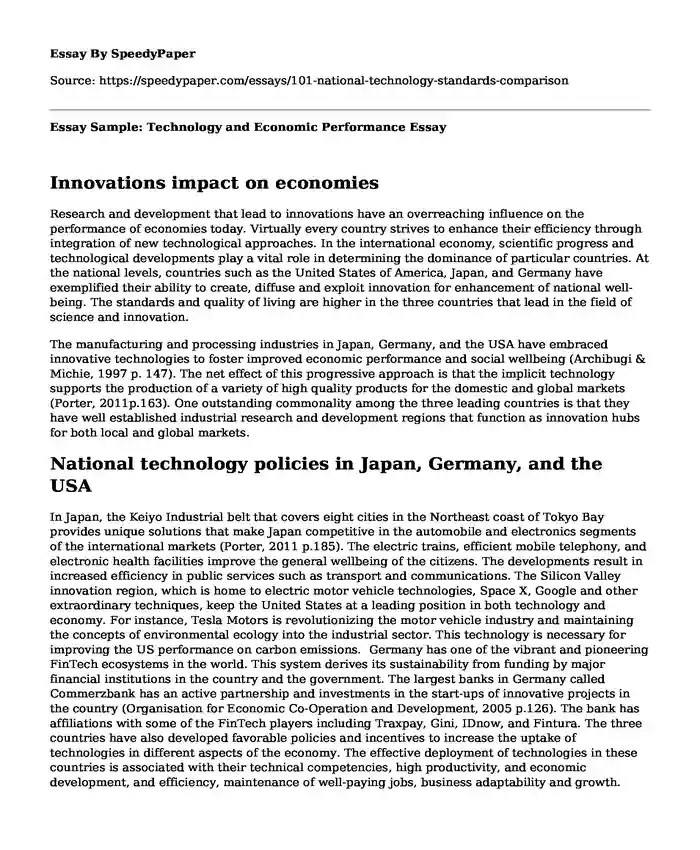
| Type of paper: | Essay |
| Categories: | Economics Technology |
| Pages: | 3 |
| Wordcount: | 721 words |
Innovations impact on economies
Research and development that lead to innovations have an overreaching influence on the performance of economies today. Virtually every country strives to enhance their efficiency through integration of new technological approaches. In the international economy, scientific progress and technological developments play a vital role in determining the dominance of particular countries. At the national levels, countries such as the United States of America, Japan, and Germany have exemplified their ability to create, diffuse and exploit innovation for enhancement of national well-being. The standards and quality of living are higher in the three countries that lead in the field of science and innovation.
The manufacturing and processing industries in Japan, Germany, and the USA have embraced innovative technologies to foster improved economic performance and social wellbeing (Archibugi & Michie, 1997 p. 147). The net effect of this progressive approach is that the implicit technology supports the production of a variety of high quality products for the domestic and global markets (Porter, 2011p.163). One outstanding commonality among the three leading countries is that they have well established industrial research and development regions that function as innovation hubs for both local and global markets.
National technology policies in Japan, Germany, and the USA
In Japan, the Keiyo Industrial belt that covers eight cities in the Northeast coast of Tokyo Bay provides unique solutions that make Japan competitive in the automobile and electronics segments of the international markets (Porter, 2011 p.185). The electric trains, efficient mobile telephony, and electronic health facilities improve the general wellbeing of the citizens. The developments result in increased efficiency in public services such as transport and communications. The Silicon Valley innovation region, which is home to electric motor vehicle technologies, Space X, Google and other extraordinary techniques, keep the United States at a leading position in both technology and economy. For instance, Tesla Motors is revolutionizing the motor vehicle industry and maintaining the concepts of environmental ecology into the industrial sector. This technology is necessary for improving the US performance on carbon emissions. Germany has one of the vibrant and pioneering FinTech ecosystems in the world. This system derives its sustainability from funding by major financial institutions in the country and the government. The largest banks in Germany called Commerzbank has an active partnership and investments in the start-ups of innovative projects in the country (Organisation for Economic Co-Operation and Development, 2005 p.126). The bank has affiliations with some of the FinTech players including Traxpay, Gini, IDnow, and Fintura. The three countries have also developed favorable policies and incentives to increase the uptake of technologies in different aspects of the economy. The effective deployment of technologies in these countries is associated with their technical competencies, high productivity, and economic development, and efficiency, maintenance of well-paying jobs, business adaptability and growth.
The three countries have pursued policies that not only accelerate the diffusion of technology but also ensure that it links with the market demands to form a seamless continuum of technology-market ecology (National Research Council (U.S.), 2012 p.87). Economic experts agree on the principle that innovation plays a central role in the commercial performance of any sector (Porter, 2011 p.172). Therefore, any country that strives to influence the global market economy must use its resources to harness competencies within the high-tech fields. Japan, the US, and Germany have already embraced this idea thus making them leading world economies (Archibugi & Michie, 1997 p. 127). This trend is likely to be witnessed in the future, in which technological research and innovation will largely determine the performance of virtually all public and private organizations.
Based on the case of Japan, the USA and Germany, it is evident that technology not only influences national performance standards but also improves the competition of economies at the international levels. In fact, technological advancement and uptake will be a possible predictor of the economic progress of countries as opposed to the previous era in which returns from sectors such as industry and agriculture were used as measures of economic development.
Reference List
Archibugi, D., & Michie, J. 1997. Technology, globalization and economic performance. New York, Cambridge University Press.
Porter, M.E., 2011. The competitive advantage of nations: creating and sustaining superior performance. Simon and Schuster.
Organisation for Economic Co-Operation and Development. 2005. Innovation policy and performance: a cross-country comparison. Paris, OECD. http://public.eblib.com/choice/publicfullrecord.aspx?p=514725.
Cite this page
Essay Sample: Technology and Economic Performance. (2018, Apr 08). Retrieved from https://speedypaper.com/essays/101-national-technology-standards-comparison
Request Removal
If you are the original author of this essay and no longer wish to have it published on the SpeedyPaper website, please click below to request its removal:
- Free Paper Sample on the Modern Method of Teaching English
- Free Essay: Social Psychology of Violence
- Essay Sample on Customer Empathy and Generational Differences
- Book Review Essay: The Age of Extremes: A History of the World, 1914-1991
- Gun Control Issues in the United States, Free Essay for Everyone
- Free Essay: Business Law Report
- Essay on Employees Satisfied = Retained & Growing: Management Matters!
Popular categories




